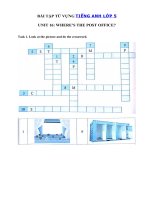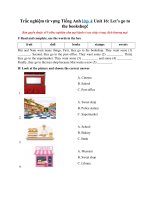TỪ VỰNG TOEIC unit 16
Bạn đang xem bản rút gọn của tài liệu. Xem và tải ngay bản đầy đủ của tài liệu tại đây (263.6 KB, 62 trang )
Unit 16
TOP CENTR/CENTER DOM OMNI HOL/HOLO RETRO TEMPOR
CHRON TRI Number Words
Quiz 16-1 Quiz 16-2 Quiz 16-3 Quiz 16-4 Quiz 16-5 Review Quizzes 16
TOP comes from topos, the Greek word for “place.” A topic is a subject
rather than a place; to the Greeks, the original word meant more or less
“about one place or subject (rather than another)”—which just goes to show
that it's not always easy to trace a word's meaning from its roots.
topical
(1) Designed for local application to or treatment of a
bodily part. (2) Referring to the topics of the day.
• If the topical ointment doesn't work on the rash, the doctor will prescribe an
antibiotic pill.
Like a topical medicine, a topical reference or story applies to something
specific, focusing on a topic that's currently in the news. TV comedians often
use topical humor, making jokes about a currently popular movie or the latest
political scandal—if possible, one that just broke that same day. Topical
humor has a short lifespan, though, because the news keeps changing and the
new hot topics just keep coming. The medical meaning of topical stays closer
to the meaning of the root, since it describes something that's put right on the
place that seems to need it.
ectopic
Occurring or originating in an abnormal place.
• A pacemaker was installed to correct her ectopic heartbeat.
Ectopic is a medical word that means basically “out of place.” An ectopic
kidney is located in an abnormal position. In patients with an ectopic
heartbeat, the electrical signals that trigger the heart muscles originate in an
abnormal area of the heart. But ectopic most commonly describes a
pregnancy in which the fertilized egg begins to develop in an area outside the
uterus, such as in a fallopian tube; such pregnancies may lead to serious
problems if not treated.
utopian
Relating to an imaginary place in which the
government, laws, and social conditions are perfect.
• Some of the new mayor's supporters had gotten increasingly unrealistic, and
seemed to expect that she could turn the city into a utopian community.
In 1516 Thomas More published Utopia, a description of a fictional island in
the Atlantic with an ideal society, in order to draw a sharp contrast with the
disorderly political situation of his own time. He created the name from topos
(“place”) and ou, Greek for “no,” since he was well aware that nowhere so
perfect was likely to exist on earth. People have long dreamed of creating
utopian communities; some of them have joined communes, societies where
other idealists like themselves have chosen to live in a cooperative way
according to certain principles. Not just communes but plans of all kinds have
been labeled utopian by critics. But we can dream, can't we?
topography
(1) The art of showing the natural and manmade features of a region on a map or chart. (2) The features of a surface,
including both natural and man-made features.
• Planning the expedition involved careful study of the region's topography.
Topography combines top- with graph-, a root meaning “write” or
“describe.” The topography of the Sahara Desert features shifting sand dunes
and dry, rocky mountains. A topographic (or topo) map not only shows the
surface features of a region but also indicates the contours and approximate
altitude of every location, by means of numerous curving lines, each
indicating a single elevation. In other words, it shows a “three-dimensional”
picture on a two-dimensional surface. Topo maps are commonly used by
hikers, surveyors, government workers, and engineers, among other people.
CENTR/CENTER comes from the Greek kentron and the Latin centrum,
meaning “sharp point” or “center point of a circle.” A centrifuge is a spinning
machine that throws things outward from the center; the apparent force that
pushes them outward is called centrifugal force.
eccentric
(1) Not following an established or usual style or
conduct. (2) Straying from a circular path; off-center.
• She keeps a dozen stray cats in her house and is rather eccentric, but her
neighbors say she's very pleasant and completely harmless.
An eccentric wheel spins unevenly, and an eccentric person is similarly a
little off-center. Most eccentricities are inoffensive to others, and some may
even do some good. For instance, riding a bicycle to work might be
considered eccentric by some people, but it's good exercise and it cuts down
on pollution. Some eccentrics are just ahead of their time.
epicenter
(1) The location on the earth's surface directly
above the focus of an earthquake. (2) The center or focus of activity.
• The destruction caused by Mexico City's earthquake was extensive because
the city was at the quake's epicenter.
The meaning of epi- in epicenter is “over,” so the epicenter of an earthquake
lies over the center or “focus” of the quake. Epicenter can also refer to the
centers of things that may seem in their own way as powerful—though not as
destructive—as earthquakes. Wall Street, for example, might be said to lie at
the epicenter of the financial world.
egocentric
Overly concerned with oneself; self-centered.
• He's brilliant but completely egocentric, and the only things he'll talk about
are his own life and work.
Ego means “I” in Latin. To an egocentric person, I is the most important
word in the language. Great artists and writers are often egocentrics; such
people can be hard to live with, though their egocentricity, an unfortunate
side effect of their talent, is often forgiven. But ordinary egocentricity, which
shows up as selfishness, lack of sympathy, and lack of interest in other
people, usually has little to do with any personal talent or success.
ethnocentric
Marked by or based on the attitude that
one's own group is superior to others.
• Some reviewers criticized the ethnocentric bias that came through in the
way the film portrayed immigrants.
The Greek word ethnos means “nation” or “people.” So ethnocentricity
shows itself in a lack of respect for other ways of life, and an ethnocentric
person feels that his or her own nation or group is the cultural center of the
world. Ethnocentric describes the kind of person who behaves badly when
traveling in foreign countries, often called an “Ugly American” (from a book
and movie of the same name). Whenever you hear someone making fun of
the way a foreigner speaks English, just remember that it's the foreigner, not
the person laughing at him, who actually can speak a foreign language.
Quiz 16-1
A. Fill in each blank with the correct letter:
a. epicenter
b. ectopic
c. ethnocentric
d. utopian
e. topography
f. egocentric
g. topical
h. eccentric
1. She claims that his remarks show an ___ bias against foreign cultures.
2. The ___ of a river valley often includes a wide, fertile floodplain.
3. The earth's orbit around the sun is ___ rather than perfectly circular.
4. An ___ pregnancy is an unusual event that poses serious medical
problems.
5. Since he hates needles, he asks his dentist to use only a ___ anesthetic
inside his mouth.
6. There's nothing wrong with liking yourself so long as you don't become
___.
7. In 1970 they founded a ___ community on a 400-acre farm, where all
property was to be owned in common.
8. Luckily, the quake's ___ was far away from any human settlement.
Answers
B. Match the word on the left to the correct definition on the right:
1. topical
a. central point
2. egocentric b. centered on one's own group
3. utopian
c. away from its usual place
4. ethnocentric d. self-centered
5. topography e. of current interest
6. eccentric
f. ideal
7. ectopic
g. placed off-center
8. epicenter h. landscape features
Answers
DOM comes from the Latin domus, “house,” and dominus, “master,” and the
two are indeed related. In the Bible, King Ahasuerus, angered by his queen's
disobedience, proclaims that “every man is to be master of his own house,”
and in the Roman empire no one doubted that this was how it was meant to
be. A domain is the area where a person has authority or is dominant—but we
no longer think of a house as the domain of a single dominant member of a
family.
dominion
Supreme authority.
(1) An area over which one rules; domain. (2)
• The Roman empire had dominion over the entire Mediterranean, which the
Romans called mare nostrum, “our sea.”
The ruler of a region has dominion over it, and the area itself may be called
the ruler's dominion. In the days of the British Empire, England had
dominion over many countries throughout the world. Though Canada has
been quite independent of Great Britain since the 19th century, it was
generally referred to as the Dominion of Canada in official documents until at
least the 1950s. The word has an old-fashioned sound today, and probably
shows up in history books, historical novels, and fantasy video games more
often than in discussions of modern nations.
predominant
influence, or authority.
Greater
in
importance,
strength,
• The predominant color of the desert landscape was a rusty brown.
Something predominant stands out above all the rest. The predominant theme
in an essay is the one that predominates—the main idea that the writer wants
to express. (Notice the difference between the adjective and the verb; be sure
not to spell the adjective with an -ate ending.) The word is widely used in
many fields. For example, the predominant language of Switzerland is
German; the predominant cause of obesity in children is a bad diet; and your
predominant reason for wanting a larger vocabulary may be to simply be a
better-educated person—though the positive effects of a large vocabulary on
one's romantic life are well known.
domineering
bossy manner.
Tending to control the behavior of others in a
• His mother was a domineering type, and not even his stepfather dared do
anything without her permission.
To be domineering is to behave like a lord. (The word lordly doesn't express
quite the same thing.) Someone who tells you what you can wear or what
friends you can spend time with could be called domineering; so could
someone who always decides what you're going to do with your free time.
Those of us who grow up with a domineering parent usually flee as soon as
we're old enough.
domination
(1) Supremacy or power over another. (2)
The exercise of governing or controlling influence.
• The region was under the domination of a single nation, even though it
hadn't yet invaded its neighbors.
Domination may sound like something that's achieved by military force. The
total domination of Europe, for example, has never been achieved: The
Roman empire could never fully dominate the northern Germanic tribes;
Napoleon couldn't conquer Spain; and although Adolf Hitler was briefly
dominant over most of the continent, he never managed to overpower
England. But the word's earliest appearances don't necessarily involve
physical force; Chaucer, for instance, speaks of a mind's domination by
strong drink. So we may observe that a great tennis player has continued his
domination of the world's courts this season, or that the domination of
popular music by rock and roll was obvious by the end of the 1950s.
OMNI comes from the Latin word omnis, meaning “all.” So in English
words, omni- can mean “in all ways,” “in all places,” or “without limits.” An
omnidirectional antenna, for example, is one that receives or sends radio
waves equally well in all directions. And Omni by itself has been used
repeatedly as a brand name for things as different as a hotel chain and a
science magazine.
omnivore
An animal that eats both plants and other animals.
• If we're all natural omnivores, she kept asking herself, then why wouldn't
her toddler eat anything but cashews and peanut butter until the age of four?
Human beings seem to be classic omnivores. Originally living as “huntergatherers,” we hunted and fished when possible but also gathered nuts,
berries, fruits, seeds, and roots for much of our diet. We're physically well
suited for both tasks; our hands are perfect for picking things, and our build is
ideal for running down even the fastest game animals because of our great
stamina. Some 10,000 years ago humans began practicing agriculture
involving both animals and plants. The other omnivorous mammals include
chimpanzees, pigs, opossums, porcupines, bears, raccoons, skunks,
chipmunks, mice and rats, and skunks. But even many mammals classed as
carnivorous (see VOR) turn out to be capable of shifting to plant foods when
necessary.
omnipotent
powerful.
Having complete or unlimited power; all-
• What really scares these men is the nightmare of an omnipotent state, and
they think that with their guns they'll be able to keep the government's forces
at bay when the time comes.
If you know that potens means “power” in Latin (see POT), it's not hard to
guess the meaning of omnipotent. In Christian services and prayers, the Latin
omnipotens is translated as “almighty” and always applied to God. But
omnipotence in a government or ruler is naturally a bit scary; as a British lord
observed a century ago, “Power tends to corrupt, and absolute power corrupts
absolutely.” So democracies do their best to make omnipotence impossible.
omnibus
Of or including many things.
• Eager to go home for vacation, Senate leaders assembled an omnibus bill to
tie up the loose ends on dozens of unrelated projects.
In Latin, omnibus means “for all.” So an omnibus bill in Congress packages
several measures together, an omnibus survey may poll the public on a wide
range of issues, and an omnibus edition of a writer's stories may bring
together just about all of them. As a noun, omnibus used to mean a large
vehicle for public transportation—that is, “for all” who could pay the fare—
but around 1900 the word began to be shortened to simply bus.
omniscient
understanding or knowledge.
Knowing
everything;
having
unlimited
• Brought up in a strict Christian family, he knew that an omniscient God was
watching him every second of his life.
Omniscience is something that a totalitarian state may try to achieve by
means of informers, cameras, and monitoring of electronic communication. If
your English teacher tells you that a novel has an “omniscient narrator,'' she
means that the voice telling the story isn't one of the characters but instead
knows what each of them is doing and thinking, with the point of view
constantly shifting from one to another.
Quiz 16-2
A. Choose the closest definition:
1. domination
a. name b. control c. attraction d. movement
2. omnipotent
a. almighty b. all-knowing c. all-seeing d. all-round
3. domineering
a. owning b. homelike c. royal d. bossy
4. omniscient
a. immense b. all-knowing c. universal d. unlimited
5. dominion
a. weakness b. kingdom c. game d. habit
6. omnibus
a. immense b. transporting c. all-inclusive d. worldwide
7. predominant
a. longest b. lightest c. strongest d. earliest
8. omnivore
a. world traveler b. meat- and plant-eater c. universe d. bottomfeeder
Answers
B. Complete the analogy:
1. educated : unschooled :: omniscient : ___
a. commanding b. lazy c. ignorant d. know-it-all
2. selective : limited :: omnibus : ___
a. everyday b. all-time c. oversized d. comprehensive
3. persuasion : influence :: domination : ___
a. household b. country c. command d. outlaw
4. weak : feeble :: omnipotent : ___
a. timid b. all-powerful c. global d. huge
5. obedient : tame :: domineering : ___
a. sweet b. easygoing c. obnoxious d. controlling
6. human : deer :: omnivore : ___
a. plant-eater b. elk c. ape d. dieter
7. property : estate :: dominion : ___
a. attitude b. difference c. realm d. country
8. larger : smaller :: predominant : ___
a. secondary b. necessary c. primary d. demanding
Answers
HOL/HOLO, meaning “whole,” comes from the Greek word holos, with the
same meaning. The root can be found in catholic. When capitalized, Catholic
refers to the worldwide Christian church based in Rome, which was once the
“whole”—that is, the only—Christian church. Without the capital letter,
catholic means simply “universal” or, when describing a person, “broad in
one's interests or tastes.”









